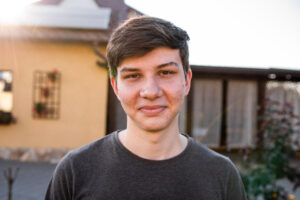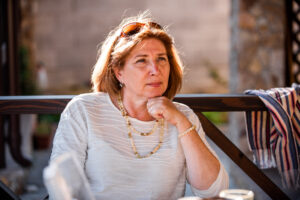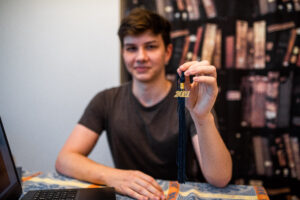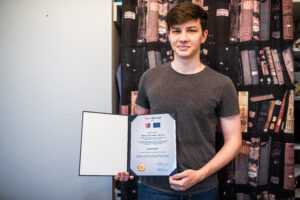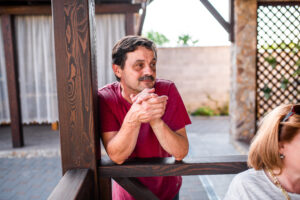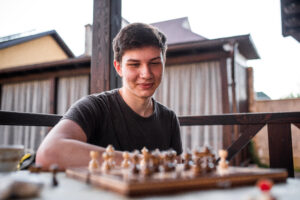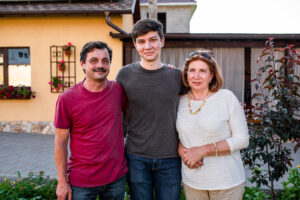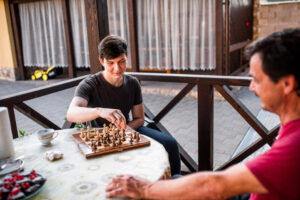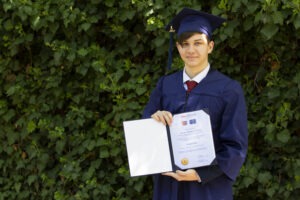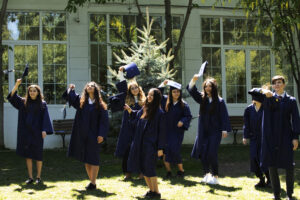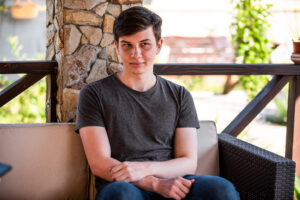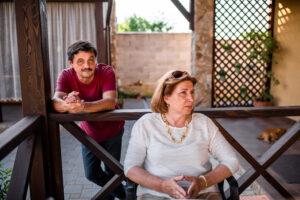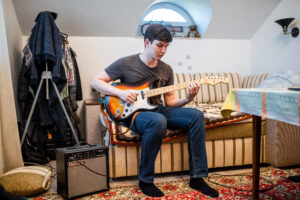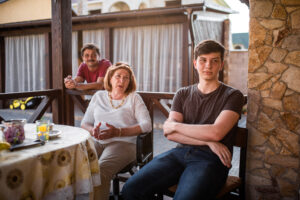
Free studies at a European school: Adrian Chiriță on what it’s like to be a student at the Eastern Partnership European School in Georgia
Have you ever imagined what it’s like to be a student in an international community where your classmates and teachers come from different cultures, and what it’s like to study six subjects instead of the 11 or 12 you are accustomed to in our schools? Adrian Chiriță is a young man who went beyond his wildest dreams. Three years ago, he was a student in tenth grade at a school in Chisinau, Republic of Moldova. However, the teenager’s life reached a turning point from the moment when his mother noticed an announcement about scholarships offered by the Eastern Partnership European School.
Together they carefully considered the opportunity and decided that Adrian stood a good chance with his application. They followed the three steps of the admission process, after which the long-awaited message that Adrian had been selected as one of the 34 students arrived. Two years of intensive studies followed in Georgia. In this interview, Adrian shares what it’s like to be a student at such a school, how lessons are taught and what were the benefits of studying in an international community.
How did Adrian join the Eastern Partnership European School?
Adrian’s entire academic adventure began in the winter of 2019, when the young man’s mother noticed an advert on social media about scholarships offered by the EU for studies at the Eastern Partnership European School in Georgia.
“I accidentally came across the advert on Facebook. I read it carefully and realised that Adrian met all the requirements to participate in the programme. I gave it to him, and we thought ‘why not?’ because he had nothing to lose: either study here or gain a new experience in an international school. So, he tried,” remembered Svetlana Chiriță, Adrian’s mother.
The admission process comprised three steps: submission of Adrian’s marks from the current semester, two tests (English and Mathematics) and an interview with the school’s administration and counsellor.
“The English test was relatively easy. It was an assessment that checked if students would be able to handle the materials taught in English. The maths test was much harder, first because there were more exercises and additionally there were some topics that were not taught in Moldova, such as statistics,” Adrian recounted.
Adrian passed all three admission steps with flying colours, and in May 2019 he received an email which confirmed that he had been accepted to the school.
“My parents were very happy. Mum was the first to see the email. I think she received one as well. She came to my room and told me to check my e-mails because I was going to Georgia. It was a huge surprise for me, that changed everything,” Adrian recalled.
Adrian was accepted to study along with four other young people from Moldova. There were 34 people in total in the class from Armenia, Azerbaijan, Belarus, Georgia, Ukraine and the Republic of Moldova.
“The news that Adrian was accepted at the school was a delight for the entire family. We knew that it would be a very useful experience for him, first of all because he would learn in an international environment which is a valuable lesson for life in itself,” said Adrian’s mother.
After they received the acceptance letter, a period of preparation followed. Adrian took part in a series of meetings with the school’s administration and coordinators, and in an international camp to which the 34 admitted students were invited. There, all the details regarding the education system were explained to them.
Adrian’s parents never doubted for a moment that their son would be going to study in Georgia. Furthermore, they truly believed that everything would be alright.
“If it were a different country and different conditions, perhaps we would have had second thoughts, but here we understood everything was provided. The school was responsible for the students’ well-being and health. We were calm because our son would not be alone, particularly as he was going with other students from Moldova. We did not worry at all that he was going so far away, especially since the school was obliged to send them home each holiday. So, they did,” Adrian’s mother recalled.
What made the parents confident was the school’s approach during the preparation process.
“The school provided all the information in a clear manner and on time, so we were well informed. We had the contact details of all the teachers and could keep in touch with them or ask any questions we might have had. However, it was not necessary in our case,” added Adrian’s mother.
System of study
The education system at the Eastern Partnership European School is indeed different to the one in Moldova. First, there is a strong coherence between theory and practice. In other words, alongside the theoretical material, students also conducted many experiments.
Another substantial difference was the number of subjects. During those two years, Adrian studied just six subjects. “There were six groups of subjects: literature, foreign languages, social sciences, mathematics, natural sciences, and arts. From these disciplines, you could select subjects to study at a standard level or in-depth.
I chose to study biology, chemistry and statistics-based mathematics in-depth, and Spanish, English literature and economics at a standard level,” said Adrian. Adrian made these choices because he wished to study bio-engineering at university and become a specialist in this domain.
Lessons were organised in singles (45 minutes) or doubles (1 hour 30 minutes), and the concept of a “year group” was also different, since students selected different subjects to study.
“Theoretically we were divided into a year group, but we stayed together for just ten minutes before lessons, it was like some sort of briefing. Afterwards, we each went to our separate classes. As everyone picked different subjects, we had lessons with different students.”
Studies based on experiments
Throughout their studies, students have to prepare different individual projects and experiments for their chosen subjects.
“For example, for natural sciences each student had to do an experiment, to research something. For biology I researched how the germination of a chickpea seed is affected by the concentration of amylase, and for chemistry I researched how fermentation is affected by the concentration of salt,” said Adrian.
Students have access to fully equipped laboratories, and all the necessary support from their teachers. “When it comes to the work, all the teachers are ready to help. Help is especially needed when you are working on multiple projects. I personally got a lot of help from the biology teacher, because the topic I chose initially had a lot of variables that were impossible to control. She helped me choose a suitable topic for my research.
The two years of studies end with the International Baccalaureate, which subsequently opens the door for pupils to study in thousands of universities across the world.
Extracurricular activities
For the six subjects, students across the International Baccalaureate programme had to do a series of activities on their own but supervised by mentors.
“Some colleagues created magazines about subjects they enjoyed. I did online maths tutoring. Additionally, you could practice activities that cover your personal interests as well. For example, I was learning how to play guitar and was a member of the chess club. As part of these activities, I organised a party for some pre-school Georgian children.
The school is equipped with a basketball court, a swimming pool and much more, so students could practice a variety of activities. The school also organises trips around Georgia for the students.
The Scholarship and the conditions of study
The scholarship obtained by Adrian covered his school fees, accommodation, plane tickets (for four school holidays a year) and even expenses covering certain study materials such as: a laptop, workbooks, pens etc.
During those two years, students were staying in halls of residence, which were on the school grounds.
“There were two per room. The internet connection was good. There was a study room within the residence hall, a kitchen, a common room with board games and a TV. There was also a medic in the students’ residence”.
Meals (3, 4 or 5 times per day) are also provided by the school.
Adrian said that students from the six countries of the Eastern Partnership were residing at the school, and students from over 60 countries worldwide were studying at the school.
“The relationships developed were relatively good, it was actually very interesting to study with students from other countries, to learn about their culture and learn a few words from other languages.”
Adrian’s departure was a good occasion for his parents to make the 4,000km long journey by car to Georgia. Once in Tbilisi, they visited their son, assuring themselves that the living conditions and studies were at a good level.
“We went to visit him in his first year of studies, to see how our son had settled in. It was a very nice experience. We visited the school and the halls of residence. We spoke to the teachers, with the principal, and with Adrian’s mentors. We had an induction visit. Our initial plan was also to visit him at the end of his studies, but it wasn’t meant to be (due to the COVID-19 pandemic),” said Alexandru Chiriță, Adrian’s father.
What happens after graduating from the Eastern Partnership European School?
Adrian graduated this summer, and on 6 July 2021 he received his marks for the International Baccalaureate. He has been accepted by the HAN University of Applied Science in the Netherlands, but he wishes to study at a university in Germany, where he will be able to study bio-engineering.
If he could go back two years, says Adrian, he would make the same decision, to be a student at the Eastern Partnership European School in Tbilisi, and he advises all students to try this experience.
Adrian’s parents were of the same opinion. They confirm that this is an incredible experience for a young person.
“It is a very interesting experience both in terms of interacting with international students and interacting with international teachers. I think this is very important for any young person, it enriches both mentally and intellectually,” Adrian’s mother said.
About the Eastern Partnership European School
The Eastern Partnership European School was opened in 2018 at the initiative of the EU for talented young people from the six countries of the Eastern Partnership – Armenia, Azerbaijan, Belarus, Georgia, Republic of Moldova and Ukraine. The programme offers high-quality education for high school students from multicultural backgrounds. The school programme also includes European studies, and at the end students obtain an International Baccalaureate certificate. From the launch of the scholarship programme in 2018, 105 students from the six Eastern partner countries have obtained scholarships funded by the European Union. Another group of 40 young people will join the programme for the academic years of 2021-2023.
The project is financed by the European Union (EU) and implemented by UNOPS in partnership with New School – Georgia’s International school, Georgia’s Ministry of Education and Science and the International Baccalaureate Organisation (IB).
Author: Elena Baranov
MOST READ
SEE ALSO

No, time is not on Russia‘s side

How to open an art business in Moldova: the experience of Alexandra Mihalaș

Be one step ahead of a hacker: check simple cybersecurity tips!
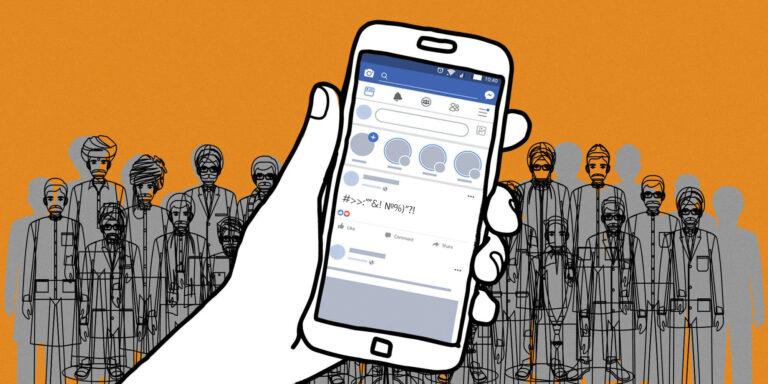
How to act and move on: strategies for women facing discrimination and online harassment
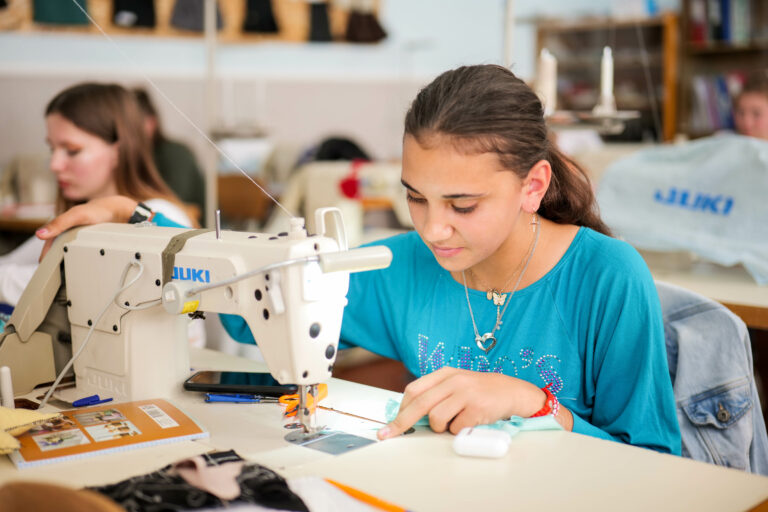
‘Learning is not a process but a journey’: the example of a school in Orhei
More campaign pages:
Interested in the latest news and opportunities?
This website is managed by the EU-funded Regional Communication Programme for the Eastern Neighbourhood ('EU NEIGHBOURS east’), which complements and supports the communication of the Delegations of the European Union in the Eastern partner countries, and works under the guidance of the European Commission’s Directorate-General for Neighbourhood Policy and Enlargement Negotiations, and the European External Action Service. EU NEIGHBOURS east is implemented by a GOPA PACE-led consortium. It is part of the larger Neighbourhood Communication Programme (2020-2024) for the EU's Eastern and Southern Neighbourhood, which also includes 'EU NEIGHBOURS south’ project that runs the EU Neighbours portal.

The information on this site is subject to a Disclaimer and Protection of personal data. © European Union,
